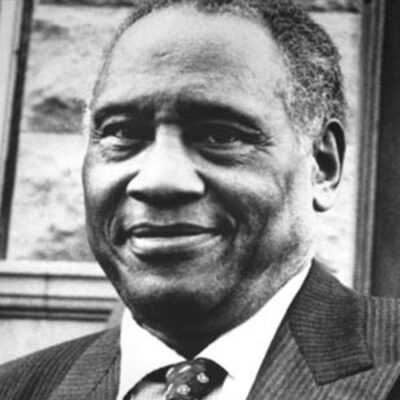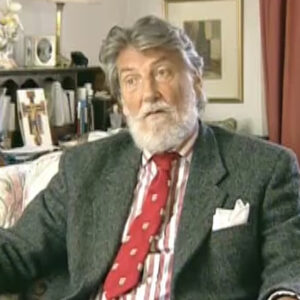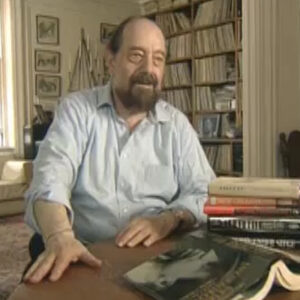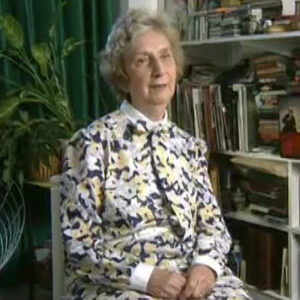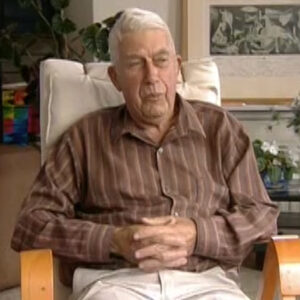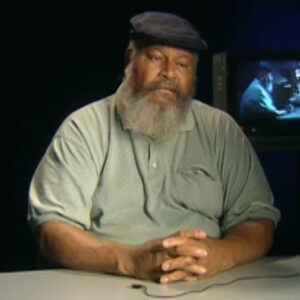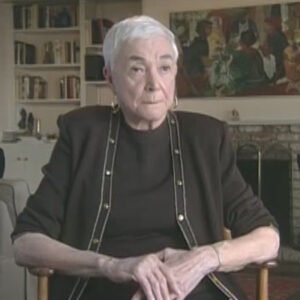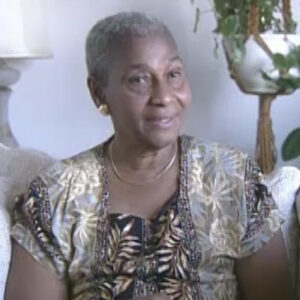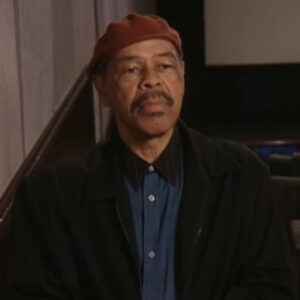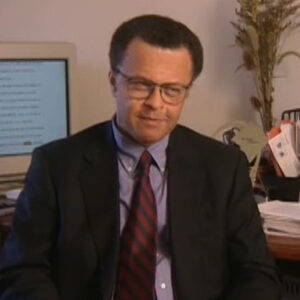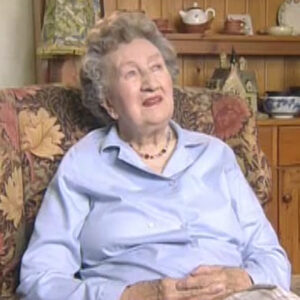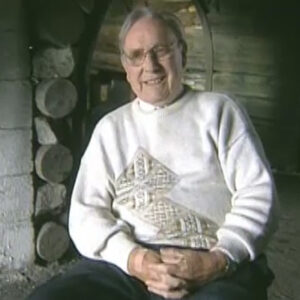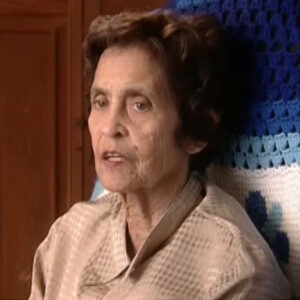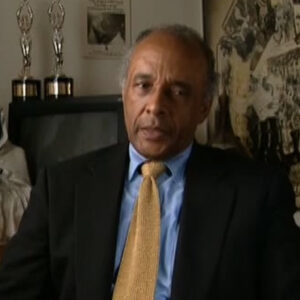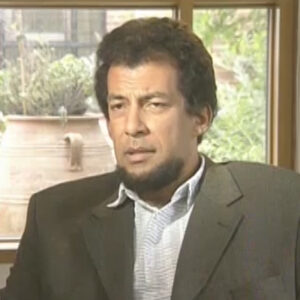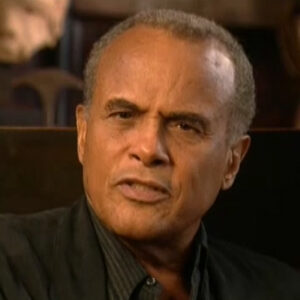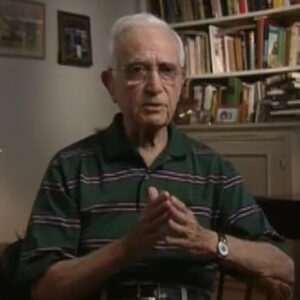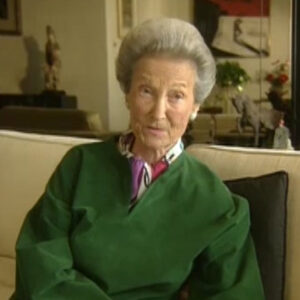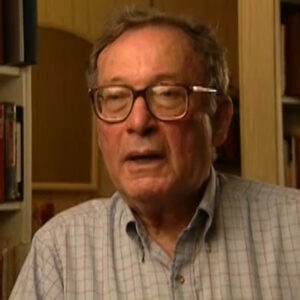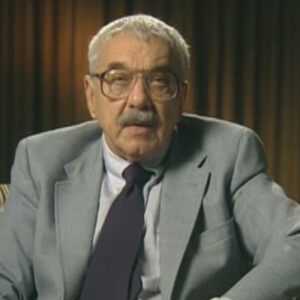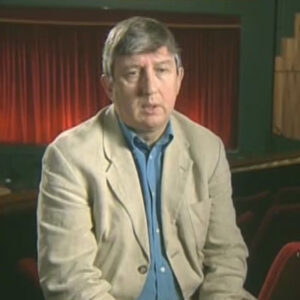Speaker I was a newspaper man and got into radio through various forms of serendipity, and I was really sort of freshman at CBS at the time, we did a ballad for Americans. It was my first full year at the network. And what what exactly was pursuit of happiness was the series was Pursuit of Happiness was a series that had been devised, conceived by the then head of programs for CBS. And he wanted to we were in a good frame of of time for the the happiness and well-being of the of America. And he wanted to celebrate that. And so he took the phrase out of the Declaration of Independence, the pursuit of happiness, which is the happiest phrase in American documents, and use that as the title for the series. And we would have had a policy of engaging stars who were passing through New York, Hollywood people, people of the theater and writers, artists. And they came on the series with programs about America.
Speaker OK, it’s OK. It’s not like the one.
Speaker OK, so it was the series. What was your position on that? I directed the series and wrote some of its elements and helped out in the in the production phase. I was a hyphenate writer, director, producer.
Speaker Now you said that it was to celebrate the current state of America at that time. What was the current state of America with was necessary to celebrate?
Speaker Well, we were prosperous. We had no inkling that we would be at war and a world war in two years. And there was a lot going on. FDR was a popular president and it was a wholesome up beat phase in our national history. And this was what year, 1939?
Speaker What what was Volson standing with the American public at the time?
Speaker You know, when that was produced at the time The Ballad for Americans was produced, Rabson was without stain of any kind in the public perception. That stain was applied later, of course, in the in a period when Stain’s became wholesale and were distributed widely. But then the very fact that he was engaged to do this is an answer to that, to the to the question of the standing of of Rabson in that period and the public’s perception of him, because the Ballad for Americans was a it was called by its composer, Earl Robinson, a cantata. And I thought that was an awfully fancy name. And he called it Ballad of Uncle Sam. And I said, that’s a little square. Why not call it Ballad for Americans? And the change of preposition for of two meant something. And he was very happy with the change. He brought the work to CBS and auditioned it for me. I liked it. I called then upon the I asked the the head of of the program department, a man named Bill Lewis, to listen to it, because after all, he would have to approve. It’s the for budgetary reasons to approve this work since it called for an orchestra and another cast, a large cast and four singers. And he came. He loved it. And we then discussed who would be the right man to sing this.
Speaker And without any hesitation, spontaneously, the name Robeson came to mind and we presented it to Paul and he happily consented and he performed it. Now, when you say he was without stain, I mean, that was political political stain, of course. But in terms of his popularity as a commercial. Media star, was he big man, was he? Well, no, no, I am not competent to answer how big he was at the time.
Speaker I do know that he was as big a figure as any in that in 1939. He was as big a figure as Madonna or any of the reigning celebrities of show business in 19 in the 1990s.
Speaker It was a big pop superstar.
Speaker Oh yeah. He was a man who was the Senesh or the Cynosure. I’ll look that up when you leave the pronunciation. And he he was highly regarded in both in the musical world and in the in the theatrical world. As an actor, as singer, he had already won kudos as an athlete.
Speaker Yeah, yeah. Now, who was.
Speaker Robinson and, you know, what’s his background basically, you know, like about him or did you know much about him?
Speaker Earl Robinson was out of Seattle. He was a kind of latter day Stephen Foster. He wrote music that was easily a symbol. And his however, his themes always bore social program. He he was for for rights, for civil rights. He was for the for the America that is that is presented in the ballad for Americans. That’s that’s a 100 percent American to use a shopworn and abused phrase. He was it was a 100 percent American work. And he considered himself and was considered to be a spokesman, a musical spokesman for that America.
Speaker Was he a was he kind of left in his politics? I mean, was he known for that?
Speaker Oh, yeah. I think that left of course, the terms left, center, right were then less frozen than they are today. One could believe in in racial equality then without being automatically suspect of of leftism or Marxism or communism. And it it was a time when liberal was not a bad word.
Speaker OK, and what about lyricist John Otis Latouche?
Speaker I knew only tangentially through that work, I did not have the same acquaintance with Latouche that I did with Robinson Robinson.
Speaker So now what was the collaboration process between Roques and or Robinson?
Speaker I don’t believe they collaborated at all. The script came to the music and the script came to was submitted to Robeson. We were inviting him. He could have turned us down. And naturally, you wanted to see what we were offering him and he approved of it. I don’t it may have worked outside of the studio in preparation, but I doubt it very much, you know. Yeah, because Robeson was a professional and he he was not the kind of man who was tentative about anything or insecure about the score. He was not the kind who would say, no, I don’t I don’t like this passage or I should come in sooner. Or he was he went by the script. And as as I was director of this of this work, he was wonderfully cooperative. There was never any show of temperament or a pulling of rank. He was a big star.
Speaker In the best sense, in the best sense of that word, and so the process is you get the music. Explain the process to me. I mean, how did it go from the time you got the concept on paper to the broadcast? Just break that down.
Speaker Well, then I proceeded to cast the program because there were actors and singers in it. And I had I believe Mark Warner was the conductor. And I always worked with my musical resources, my musicians and my conductors and one of my composers, because in those days we didn’t use canned music. It was forbidden on the networks to carry recorded musical speech, not on the network. So there was a house orchestra and there was there was a stable of composers upon which I drew a resident at in the CBS ranks. Of course, this was outside. Robinson was an outside composer and the preparation for that production was routine except on a on a bigger scale. It was not done as my previous programs had been in a studio without an audience. This was done in a playhouse on Broadway before an audience. And it was a first for me in that regard. And that had a lot to do with the the acclaim that day that greeted that production on the air, because then the the applause and the reaction of that audience, the immediate audience was very, very intense.
Speaker Yeah, that was that was my next question. What was the reaction of the audience, the studio audience?
Speaker Well, they cheered. They were, yeah.
Speaker The big drop as well.
Speaker OK, so so the reaction of the studio audience was what the audience cheered very loudly, gave in innovation and the cheering was unusual in that it wouldn’t stop. And we had to announce the closing credits against the wall of sound and that the reaction of the of the radio audience was also very quick to come in. Lots of calls and lots of mail. It created a great deal of excitement.
Speaker Even I don’t know whether you’re aware of the excitement penetrated the Republican Party and at the same level that seemed to penetrate the Republican Party not long after that, that program was done as a matter of weeks. It might have been a month to the Republican National Committee asked for permission.
Speaker So I think it’s done within the neighborhood. OK. All right.
Speaker OK. You know, before your Charles Cronkite back to the past, but you’re not leaving to get another network, another. Oh, OK. All right.
Speaker OK, Roland. OK, great.
Speaker So you talk about the Republican national listening audience and a Republican Party in particular, the Republicans, the Republican National Committee got in touch.
Speaker Yeah, I can’t believe he left his on the street in terms of the Republican National Committee. Yeah, give me that. OK, ok. OK, OK.
Speaker So the reaction was what the reaction of the Republican National Committee was very positive. They wanted to do it at their national convention to have the song sung. However, whether they tried to reach Rabson or not. I never knew it didn’t it didn’t go through me because I, I had no proprietorship in that that work. And it was it was performed ballot was performed at that convention sung by Ray Middleton.
Speaker Was was that the network to get a lot of phone calls and the new Republican you you know, from the audience?
Speaker Oh, yeah, there were there were lots of calls of phone calls and mail and requests for repeat performances and things like that. And then it was recorded several times. I think I think Decha. I’m not sure about about that.
Speaker Let me ask you this. Why do you think it had such a strong chord in people?
Speaker Why do you think?
Speaker Well, several factors. I think that climate was favorable, that it that people felt good about about America. And and the concept has, as projected through the music and the libretto was one of reverence for the melting pot. It was a celebration of our ethnic diversity. And that is very clearly put forth in the Latouche lyrics and then the folk character, the semiformal character, the Stephen Foster element of of Robinson’s music, which was as I, as I indicated, easily assimilated. It wasn’t highbrow and it was tuneful and was singable.
Speaker Do you think that Paul’s presence had anything to do with that?
Speaker I think it had a great deal to do with it. First of all, he’s such a presence. It is a greatness about Paul, his stature, his dignity, the voice itself meant something. And the the very fact that that the spokesman for America that on that half hour wasn’t black.
Speaker Just as later I did a program for the Democratic National Committee to re-elect Roosevelt. And I had a number of people on the program, celebrities and farmers and workers and students and and a man whose past 100 years had voted for Lincoln. And he was going to vote for FDR the next morning. And he was followed by a young girl from Georgia who was 16 years old or 18 and was voting for the first time the next day, I think, 18 years old. And she introduced the president.
Speaker And I like the the concept of spokesman being from the from the from the people and not some metal carrying celebrity.
Speaker Um, are you yourself, I mean, at the time, what were your political persuasions?
Speaker You just I was a Democrat as I am today, and I’m a Jeffersonian Democrat. And I I was in tune with Robinson’s music.
Speaker Do you think I mean, in terms of his life, you know, he had just come from the Spanish Civil War. He had what he was, you know, allowed against fascism. Uh, you come back and I think he had.
Speaker They do so well, then, yeah, so here’s the problem.
Speaker But he really politically, he was left more left than that song and people seem to know it was they know they knew it and it didn’t bother them because, you know, Franklin D. Roosevelt was considered left. Bye bye. Good. A good element, perhaps a majority of the Republican Party. And, you know, all Democrats, all intense Democrats come under the suspicion of any rightist as being leftist.
Speaker And he wrote, of course, the issues were not only not so obvious then as they became later, OK, and, um.
Speaker So do you know how successful the recorded version was?
Speaker No, I have no idea of the of the sales or its market marketability. I had no I had no stake in it. I had no percentage of it. Otherwise I would have been acquainted with the figures. I was working too hard to even be aware of that and in subsequent programs.
Speaker Um, were you aware of an incident when Roxanne came to L.A. to perform Ballad for Americans at the Hollywood Bowl here?
Speaker You know, I don’t remember. I don’t think I was here then.
Speaker OK. He did come with that. He was able to get a hotel room.
Speaker Not really. Yeah. So I was just wondering if, you know, so man in the production, I know in the production of this piece, uh, nothing politically controversial.
Speaker Really never raised its head. Never. I have an objection. Never descent. I don’t think there was a lot of mail. I don’t think there was a single negative reaction. Not that I not that was called to my attention.
Speaker Mm.
Speaker Now, what did you think years later, when were you were aware of Paul Robson’s, you know, statements about Russia and its consequent being snatched from his passport being taken away? And I mean, did you pay any attention to that?
Speaker Oh, one could not possibly pay no attention to that. It was front and center. And it was a very deep concern to all who care about civil liberties. And the it was a totally lunatic and cowardly and despicable period when when not only Paul Robeson was denied a passport, but so was Arthur Miller.
Speaker And so and so was a justice of the Supreme Court of the United States, denied a passport in that same period so one could not possibly avoid unless you are deaf and dumb and I mean dumb and dumber, and in the sense of being ignorant and not caring, it had to be it had to be noticed.
Speaker Um, one other thing, uh, the the mythology and the mythology.
Speaker But but the America that that the ballots for Americans projected, you know, the melting pot, uh, you know, the popular democracy thing, that in reality there was a difference between that and what was really going on.
Speaker It seems to me maybe wrong.
Speaker And so in the conceptualising of an accepting, uh, Leticia’s lyrics and putting that it was a celebration. But did anybody even say, well, you know, maybe we should.
Speaker Talk about what’s wrong or something.
Speaker You know, the the objective. OK, OK. The objective of Ballad for Americans was not to run a short course in social justice or in democracy or any of that. It was not it was not exegetical. It was a song justice as much as as swane as a song, you know. And I think that if there were any who canceled because because the program did not discuss discrimination or did not discuss lynching in the South or did not discuss many, many very real and and important issues, that was not that was that would have been alien to the intention and to the spirit of this which of ballad for Americans, which was, after all, a simple statement of faith and of of pride in the tenets of the founding fathers who are cited in this in the in the best of America. That indeed followed the pattern of the series itself, which dealt with the pursuit of happiness.
Speaker Got it. That’s good. Um, how long did you work on that series?
Speaker I think it ran I’m not sure, probably 26 weeks.
Speaker And you had to come up with a new show every week?
Speaker Yes, sure. That was we were accustomed to that that pace. However, I did not have to write and direct and produce my own as I did later, OK.
Speaker Had you known Paul before then? No, you never know.
Speaker Of course one would have to be. You spend time circling the earth in a spaceship not to know about him.
Speaker What was your first impression when you actually met him?
Speaker My first impression was that I’m sure in in estimating the the the charisma and the stature of this man, I, I dare say that my impression was not much different from that of a bobby soxer, except that I didn’t work with bobbysoxers and people don’t know if I was like, oh well, that they’d me maybe maybe the allusion to Bobby socks that maybe dates me.
Speaker But anyway, people there are enough people out there who know what a bobbysoxers is. It’s not somebody who socks Bobby.
Speaker So. OK, know. No way with your impression with that.
Speaker Well, I felt hearing him sing, I was in the presence of a great a great artist and a memorable, unforgettable voice.
Speaker And and he was very enjoyable to work.
Speaker Oh yes. He was he was charming. He was engaging. He he had I think perhaps.
Speaker The overriding air quality in in meeting the impression one got was one of dignity and unforced dignity, a kind of native dignity, that he carried himself well and he spoke well and he was courteous. And he he it was hard to to conceive of Paul raging in anger or cussing or, you know, or swearing.
Speaker I don’t mean to say that he was this kind of a figure. He was not godly, godly. But he was he was a mensch as as they say, and in the in the petrol.
Speaker There was a period of succah, the Spanish Revolution, the Franco revolution against the against Republican Spain when conservatives latched on to the term premature antifascist, that was somebody who was against Franco because they they were was a great element of the right, which was sympathetic to Franco and wanted to see what they considered to be a dangerously left leftist republic in Spain overthrown. And anybody who raised his voice against what is going on in Spain, where a peaceful civilian population was invaded by by fascist elements with the help of the great help of Hitler’s Germany, was treated as something of was not not to be admitted to polite living rooms and dinner parties. And I think Rabson fell under that that cloud and a great many of us did. I myself was was outraged by the civilian bombing by the Nazis of of Guernica and Altimari Altamira. I think it was was bombed. And I wrote a piece called The Fly Through the Air that was carried on CBS, which won the top drama award of that year. So so the the country at large was not did not share that view of the so-called quotes. Premium antifascist, a premature antifascists. The country itself didn’t. And of course, as soon as we realized that that we were on the on the hit list of fascism, then the attitude changed, of course.
Speaker Do you think?
Speaker His participation in the ballot for Americans at. To what extent do you think it increased his, let’s say, commercial viability as a celebrity?
Speaker I mean, it couldn’t have hurt and it probably helped because the network CBS reached for 500 stations and it was a great success and people loved it. How could it how could it do other than to raise his stock?
Speaker Is there anything about that incident, about production, do you think, that I might have missed?
Speaker And yes, the production itself, the concert itself, you weren’t born yet.
Speaker You missed it. You missed it. I have another question. And this is just to quote car one again, if I may quote the classics any time. And that same program, they fly through the air. You said there is a ratio to our heroes are made by odds. How does that apply to those?
Speaker The odds were against Rabson once the forces of of the blacklist and McCarthyism got going. And he was heroic in his resistance to it. I think any man, any man, any woman who stands for the rights of all people, who stands for the articles of the Bill of Rights, who stands for a world that is saved from Holocaust and spared the the letting of blood in massive proportions every 25 years or so.
Speaker These people are the heroes and.
Speaker Certainly. Anybody who like Horatio at the bridge is fighting against a powerful force is a hero. The descent, a great many of the dissenters in American history, were heroes not recognized as such in that time, but certainly recognized as such.
Speaker Later on with perspective.
Speaker You know, the thing that statement makes me realize that, in fact, you know, if you ask kids now and they basically don’t know who he is, you know.
Speaker Well, but they that’s not that’s not in disrespect of rule of law often because many stars like Charles Laughton or Joan Crawford, people of that nature, they’re not recognized by people, by young people today. They have no memory of a day, they tend to telescope history and to them, World War Two perhaps melds with World War One and I think history becomes too easily forgotten.
Speaker Especially as the government tries to write you out. That’s right.
Speaker OK, I’m sad.
Speaker Yeah, well, since I mean, I have to say yes there, I think in the archives treating of Paul Robeson, one contribution, one appearance has been generally neglected. In 1945, the Herald Tribune, the New York Herald Tribune are the real the spokesman for a moderate Republican Party. The moderate Republicans historically annually held a conference call, the Herald Tribune Forum, which is a week long. It was always held in the in the ballroom, the grand ballroom of the Waldorf Astoria in New York City. And it was opened every year by the sitting president of the United States. And in 1945, they had a theme that went with every every forum. The theme in 1945 was The Responsibilities of Victory. And the publisher of the New York Herald Tribune, a a pristine Republican, was Helen Ogden Reed. Mrs Reed telephoned me. At CBS and asked whether she could come to see me, which was extraordinary, I was shocked because she was an important woman editor, one of the great papers in the country of the world.
Speaker And I said, I’ll come to see you. She said, no, I will come to see you. And she was a kind of woman when I met her who had her way. She came to see me and she said, we are going to hold this forum this year. The theme is the responsibility of a victory.
Speaker Will you write the keynote speech keynote? Piece for us. If it’s an old that’s fine with us, and I said I’d be honored to do that and I wrote it and I sent it to her.
Speaker She received it, she was very happy with it, she said, come to see you again and I said by now I knew better than to decline that.
Speaker And she came and she said, now, who are we going to get to do this? And I I began to think of the casting options for this piece.
Speaker And she said. You know, it would be wonderful if it were to be a soldier.
Speaker And I said, yes, that but that already begins to limit the number of people, the number of soldiers who who can handle this kind of language in the steam. And she she didn’t listen to me, she she had wonderful, sparkling, clear blue eyes that could go right through you and she didn’t listen to what I said.
Speaker She said perhaps even a wounded soldier wounded in service.
Speaker And I said, well, that dramatic but further limits the casting potentials.
Speaker And she didn’t listen there either. She said, you know. It might be wonderful if he were black. And I said, yes, that would be wonderful, wouldn’t it? And then she thought said, what about Paul Robeson? And I said, that would be marvelous. Yes, she said, where is he?
Speaker And I said, I don’t know. But I there’s an agency right in this building that knows the movements of celebrities.
Speaker She said, Could you find out? I said, I’ll try. I dialed and I got my party. And he did know. He said, Paul is in Toronto right now, is in a in a play. And I looked at my watch and I saw it was about the time it was afternoon and that maybe if he was doing a matinee, he’d be in the theater and perhaps if I were lucky, I’d catch him before he went on. So I got the number of the theater. I called the theater. They said the backstage number, they gave me another number, I call that number and got Paul. There was a stage manager answered and he said Paul Robeson there said, yes, may I speak to them? A little hesitation on came Paul. And I told them what this invitation was and what the occasion was.
Speaker And he said, Would you send me a script? And I said, Certainly. And the script went to him and Paul did it.
Speaker And the New York Herald Tribune carried the text of that of that piece of mind, and the editorial cartoon was based on the piece, the original editorial cartoons by one of the perhaps the leading Republican cartoonists in America that in 1945 was the stature and the acceptance and the respect for Paul Robeson. And this I’m looking for the date. It’s 1955. I think it was maybe the spring of 35, but that that was I don’t know whether it was nationally broadcast, but it was certainly nationally. The Herald Tribune was was read nationally.
Speaker How many days do you rehearse for that? None.
Speaker You know, I met Paul at just before he was to go on and he read it to me and I had no suggestions, it was perfect reading, OK?
Speaker I mean, how many days did you rehearse? About four Americans.
Speaker Oh, that was four Americans that you’re talking about this thing about the other.
Speaker Days you you been brought up in television, we were working hours and units of hours.
Speaker And.
Speaker There was, I think, the an exception made because of the scale of the production by rehearsing the orchestra separately, but the orchestra with cast being combined, I think we did it in four or five hours, that’s all.
Speaker We’re on the air.
Speaker But radio, that was one of the one of the remarkable things about radio that it did not require a six figure set wardrobe.
Speaker Kamras intercutting. It is all it’s all there and.
Speaker The thing about to go ahead, oh, I was just coming, you’re right.
Speaker You know, when you when you compare radio and television radio for all its.
Speaker For all its flaws, and there was there were a number of them, never was there a term in radio. That corresponded to couch potato or boob tube never.
Speaker Because the audience participated. They had to think they had to furnish their own images. It wasn’t meant for chewing gum, for them it was mental challenge.
Speaker And about if Americans really didn’t make it.
Speaker Yeah, yeah, yeah, yeah, it was a battle for Mencken’s, an emotional piece, as well as a side piece.
Speaker Just as that can be a pure emotion to wave a flag, that’s not that doesn’t mean that you’re necessarily mean that you’re a flag waver.
Speaker And then in the pejorative sense, it means that you love your country and it means that that you’d better love it for for the right reasons. And I think people who loved their country then did for the right reason that they do today, too. But I mean, there’s so much dross, there’s so much that’s thrown in there, you know, like sand and gravel thrown in their faces by the events.
Speaker Right along Spotless World.

